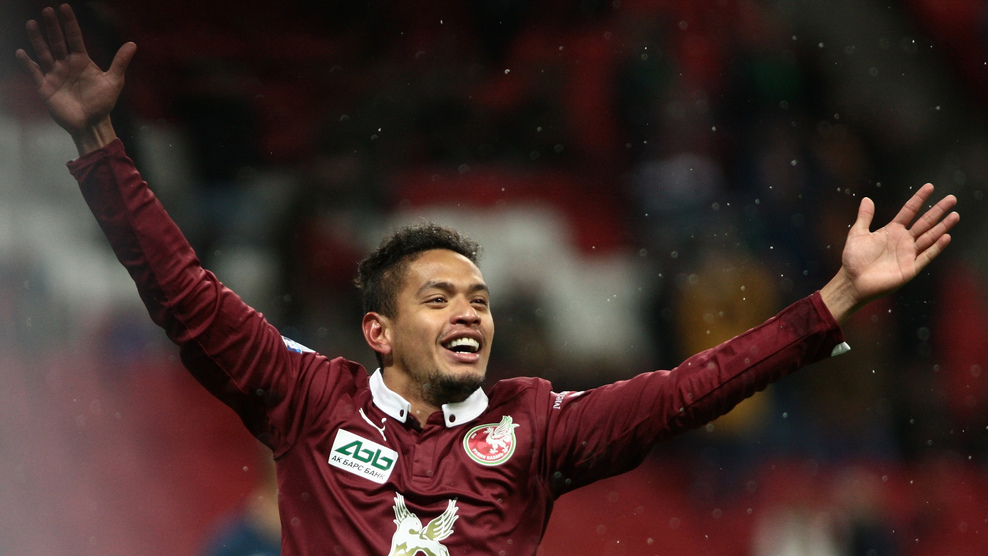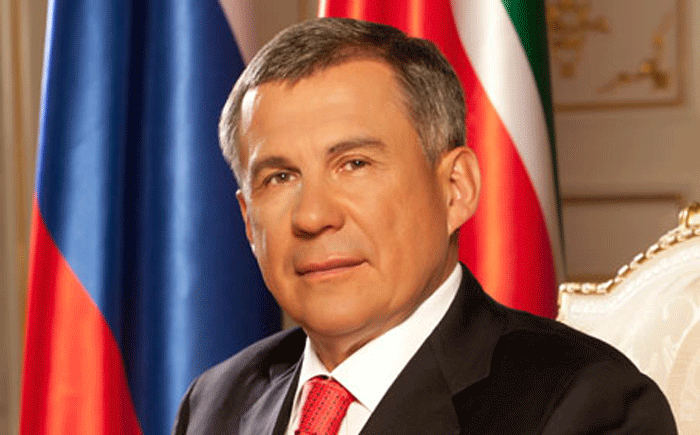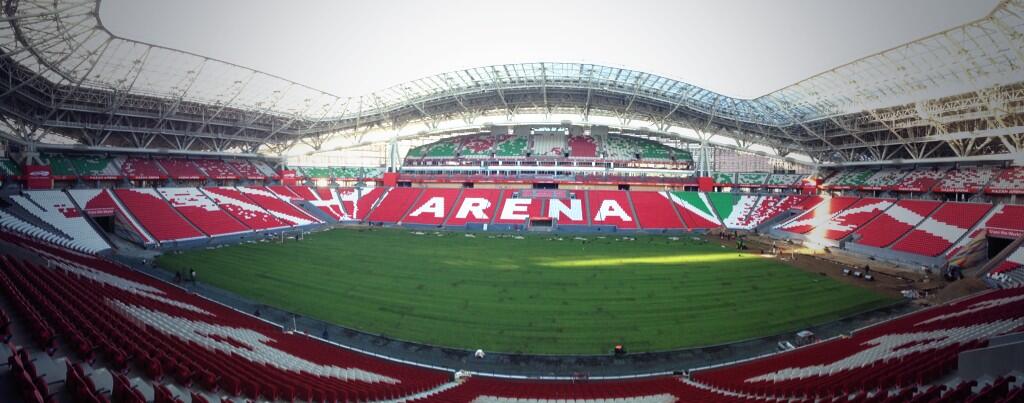By David Sansun –
Rubin Kazan is a club in transition. Rubin, which has won the Russian championship twice, has seen multiple members of its staff come and go, and in many ways the club has become a revolving door, which, for quite some time has resulted in instability on the field. These multiple changes have not gone down well with some sections of the support, particularly the ultras, who have become outspoken against the uncertainty that is caused by the continuous changes to the front staff at the club.
Rubin’s House of Cards
The period of instability began in the 2011-12 season, in August 2011, the club parted ways with president Alexander Gusev, who had been with the club for five years. Gusev had lead the club through its most successful period, winning two league titles in 2008 and 2009, but towards end of his tenure the club had started to underperform. His replacement was to be Dmitriy Samarenkin, who, after a productive period with the city’s bandy club, Dinamo Kazan, had gained favour with the President of Tatarstan and famed Rubin fan, Rustam Minnikhanov. Upon arriving at the club, Samarenkin outlined his objectives for the future:
“You know that when working with the Dinamo Kazan team we achieved every height there is in bandy. We were Russian champions, winners of the Russian Cup, we won the Champions Cup, World Cup, that is to say, we were the top club of the world. I realise that achieving all this in football is incredibly hard but we will move towards it.”
His reign in football, however, did not last long. Following three successive top three finishes, the club underperformed in the league and only achieved a sixth placed finish when, in order to change its schedule, the Russian Premier League ran for an extended 13 months from March 2011 until May 2012. They had, however, managed to qualify for European Football by winning the Russian Cup with a 1-0 victory against Dinamo Moscow.
Then on May 29, 2012, shortly after the end of the season, Samarenkin tendered his resignation, stating “personal reasons”. Once again, the replacement was nominated by President Minnikhanov, who chose a local tycoon, Valery Sorokin, chairman of the holding company Svyazinvestneftkhim which also holds shares in many of Tatarstan’s biggest companies. As Minnikhanov once again had handed out Rubin’s presidency as a personal favour to one of his many business friends, Rubin’s structure appeared increasingly to resemble a house of cards.
Currently Sorokin maintains his position at the club, and fans have developed a largely negative impression of his dealings there. Sorokin, along with another addition from summer 2012, General Director Andrey Gromov, are readily labelled as “crooks”, and are credited with the downward spiral of the club. Some fans have now begun to voice their opinions on the future leadership of the club. On Rubin’s official forum one fan said: “Kazan today was beautiful, thanks to our mayor Ilsur Metshin and his team. This man should be put in charge of our club. Chase the crooks Sorokin and Gromov away with brooms, and I am sure he can find the people and material to return the club to its previous level”.
Some players have also been vocal in their criticism of Gromov, and former Rubin defender César González Navas also spoke out not long ago. After 6 years with the club, the Spaniard departed on a free transfer to Rostov in July 2015, and in a recent interview, he stated that “after his [Gromov’s] appointment, I was not happy at the club”.
The Purge and the Consequences
Finally in the 2013-14 winter break Gromov was pushed out, along with long standing, legendary, Turkmenistan manager Kurban Berdyev, who had been at the club for 12 years. Berdyev’s spell in Kazan included promotion to the top flight in 2002, a third place finish in their first season, and back in the top flight the following season, which consequently lead to the club’s first European football in the UEFA Cup. Champions League football came a few years later, as two consecutive league titles put Rubin on the map. Some impressive performances in the Champions League (including a win against Barcelona) helped the club attract some high profile players.
Carlos Eduardo joined the club in 2010 for around €20 million, and was the high point of a spending spree that included transfers of José Salomón Rondón, Yann M’Vila, Salvatore Bocchetti, Roman Eremenko and Obafemi Martins. Their success on the pitch varied, but by and large, Rubin’s foreign signings did not perform as expected. Their poor performances were key to Rubin’s downfall—because they could not reach the heights they had hoped, the club had to gradually cut spending, and Financial Fair Play meant that the club was now threatened with financial penalties from UEFA if they did not control their budget.
Berdyev departed as the club languished in the bottom half of the table in the 2013-14 season, and although the fans remained loyal to him, many did agree that it was a time for change if they were to see any hope for their club in the immediate future.
Berdyev’s replacement, however, soon had them doubting the decision, as inexperienced former Lokomotiv Moscow youth coach Rinat Bilyaletdinov took the helm in his first senior managerial role. Bilyaletdinov, who is of Tatar descent, spent most of his career at Lokomotiv. Rinat is also the father of ex-Everton midfielder Diniyar Bilyaletdinov, who later was signed by Rubin on a free transfer in summer 2015 following a disappointing spell at Spartak Moscow.
Bilyaletdinov’s first task upon taking the reins was to recruit his coaching staff, as many of Berdyev assistants departed when Berdyev was let go. Under the stringent financial restrictions that followed a poor couple of seasons, Bilyaletdinov faced a herculean task in trying to take the club back to where it had been just five years ago.
The days of big money signings were over, and many of the larger earners had departed the club. José Salomón Rondón and Cristian Ansaldi both went to Zenit for big money, while Alexandr Ryazantsev joined them on a free transfer. The pull of Champions League football and a larger pay-check also led Bibras Natkho first to move to PAOK, and then after just six months, he returned to the Russian Premier League to play for CSKA. Natkho’s departure was closely linked to Berdyev’s as they were both Muslims and had a great relationship (Natkho is an Israeli-Circassian).
Bilyaletdinov – Fixing Rubin Kazan
These four departures in particular hit the club hard, and, after a poor start to the season, Rubin managed a ninth place finish in Bilyaletdinov’s first year, which was greatly aided by the arrival of a new general director in the form of Airat Garaev
Garaev’s arrival had a clear impact on transfer policy in that the club now identified young Russian players as the way they wished to proceed and also frequently gave a second chance to players who had not impressed big clubs in the past. Key examples of the latter are Ruslan Kambolov formerly of Lokomotiv, and Maxim Kanunnikov formerly of Zenit. The Bilyaletdinov/Garaev combination lead to a much more open policy at the club, with more transparency as to how the club was operating, as well as up to date and regular information on transfers and player fitness, something which previously had been at a premium. Also, there have been regular in depth interviews with the local news agency Business-Online, which offers a great opportunity for fans to get on the same page as those who are running the club. The duo were very astute in the transfer market and equipped the team with a mixture of experience and youth which payed great dividends in an impressive and much stronger finish in fifth position for 2014-15. Bilyaletdinov’s home grown policy earned him high praise throughout the season, and his ideology looked to improve the Russian national team’s future with a domestic World Cup on their horizon, as six Rubin players were called up to the Russian side throughout the season, five featured in a single game against Kazakhstan, a record for the club.
In addition to major changes in terms of management, the club have had serious issues with their stadium. The 2014-15 season saw Rubin use three different home grounds. The primary stadium used was the Central Stadium, their long term home. In August 2014, however, they were able to move into their brand new 40,000 seater Kazan Arena, the first stadium ready in preparation for the 2018 World Cup. Unfortunately, due to the World Swimming Championships in July 2015, they had to move out before the season resumed after the winter break in March 2015 to allow the stadium to be modified. The rest of the season saw them switch between Central and also the Rubin Stadium in Sotsgorod, due to fire safety issues raised about the Central Stadium.
Despite undecidedness on the part of the fans regarding the way the club is being run and managed, the position of the team in a footballing sense is still relatively positive. With European football back in Kazan this season, the fans have something extra to look forward to, and despite a poor start to the league, they have kicked off their Europa League campaign with a win against Sturm Graz. The 2015-16 season is an important, pivotal one for the club. On the one hand, a good performance this year could lead to a loosening of the financial restrictions the club has had to work under, and a chance to add to the solid foundation that has been built. A poor performance, on the other hand, could be the start of another downward spiral, with an exodus of their talented youngsters likely and a repeat of the situation that occurred when Berdyev departed. Time will tell what will happen, but the structure behind the team is at the strongest it has been in some time.
From Berkshire, England. Video games helped ignite David’s interest in Rubin Kazan after he had read about their title winning season in 2008. David has been a keen follower and watcher of the Russian Premier League since 2010, but only recently started to write about it. Domestically, Arsenal are his team, so he feels blessed that he is able to watch two excellent footballing sides. Follow David at Twitter @RubinKazanUK.























COMMENTS